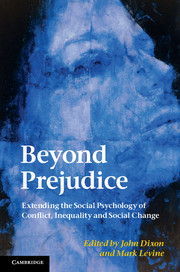Book contents
- Frontmatter
- Contents
- Figures
- Tables
- Contributors
- Acknowledgements
- Introduction
- Part I Beyond prejudice
- 1 From perception to mobilization: the shifting paradigm of prejudice
- 2 Prejudice, social identity and social change: resolving the Allportian problematic
- 3 An ambivalent alliance: hostile and benevolent sexism as complementary justifications for gender inequality
- 4 Prejudice and dehumanization
- 5 Stereotyping, prejudice and discrimination revisited
- 6 Beyond ‘old’ and ‘new’: for a social psychology of racism
- 7 The notion of ‘prejudice’: some rhetorical and ideological aspects
- 8 The prejudice problematic
- 9 Implicit prejudice in mind and interaction
- 10 Rethinking the prejudice problematic: a collaborative cognition approach
- Part II Prejudice and social change revisited
- Index
- References
4 - Prejudice and dehumanization
from Part I - Beyond prejudice
Published online by Cambridge University Press: 05 June 2012
- Frontmatter
- Contents
- Figures
- Tables
- Contributors
- Acknowledgements
- Introduction
- Part I Beyond prejudice
- 1 From perception to mobilization: the shifting paradigm of prejudice
- 2 Prejudice, social identity and social change: resolving the Allportian problematic
- 3 An ambivalent alliance: hostile and benevolent sexism as complementary justifications for gender inequality
- 4 Prejudice and dehumanization
- 5 Stereotyping, prejudice and discrimination revisited
- 6 Beyond ‘old’ and ‘new’: for a social psychology of racism
- 7 The notion of ‘prejudice’: some rhetorical and ideological aspects
- 8 The prejudice problematic
- 9 Implicit prejudice in mind and interaction
- 10 Rethinking the prejudice problematic: a collaborative cognition approach
- Part II Prejudice and social change revisited
- Index
- References
Summary
Prejudices are demeaning views of others, and what could be more demeaning than to view them as less than human? Instances of dehumanization appear in the historical record when groups are in violent conflict and in toxic contexts of genocide, atrocity and interethnic hatred. Familiar examples include Nazi portrayals of Jews as vermin and colonial images of Africans as simian brutes. Expressions of extreme prejudice often seem to involve metaphorical equations of disdained humans with degraded nonhumans. Of course, dehumanization is not simply a historical relic. There is ample evidence that forms of it continue into the present. A few contemporary examples from recent scholarly work may help to set the scene.
Hagan and Rymond-Richmond (2008) examined the experiences of Darfurian refugees from southern Sudan, who have suffered atrocities at the hands of Janjaweed militia and Sudanese government forces. These atrocities have been motivated in part by a racial agenda of Arabization. Attacking forces have used transparently dehumanizing epithets during their raids: ‘They called her Nuba dog, son of dogs’; ‘You donkey, you slave, we must get rid of you’; and ‘You blacks are like monkeys. You are not human.’
- Type
- Chapter
- Information
- Beyond PrejudiceExtending the Social Psychology of Conflict, Inequality and Social Change, pp. 89 - 104Publisher: Cambridge University PressPrint publication year: 2012
References
- 24
- Cited by

